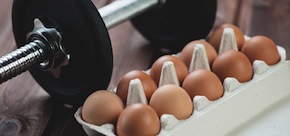It is a well-known fact that protein helps to build and repair muscle. Unfortunately, as we age our muscle-building efficiency declines. So, does this mean we need to eat more protein as we get older? According to their research, the authors of a recently published study in the American Physiological Society (APS) certainly believe so.
The current Australian dietary guidelines recommend a daily protein intake of 0.75g per kilogram bodyweight for women; 0.84g/kg for men; and around 1g/kg for pregnant and breastfeeding women, and anyone aged more than 70. So, that’s 56g protein per day for a 70kg male. (American guidelines are similar, with 0.8g/kg protein recommended daily for adults.)
However, the authors of the study – which included 20 healthy adults aged between 52–75 years – “observed a definitive effect of a higher amount of protein intake in meals [1.5g/kg versus 0.8g/kg daily] on whole body net protein balance and muscle protein synthesis”.
For older individuals, maintaining and building muscle is especially important, as muscle mass declines at a much faster rate. So, slowing it down, in turn, will help you to lose and maintain weight more easily, and preserve your physical strength for an improved quality of life.
If you’re struggling to meet the recommended daily protein intake, let alone doubling it, consider adding more wholesome sources to your meals – such as unprocessed meats, poultry and fish – instead of relying on protein powders, which can be quite processed. If you’re vegetarian, consider adding more legumes, eggs, natural yoghurt, unprocessed cheeses, nuts and seeds and quinoa to your diet.
Some ideas to get enough of the muscle-building macronutrient in your diet are:
- snacking on protein-rich foods – such as boiled eggs, trail mix of nuts and seeds, hummus dip with veggie sticks, cheese and seeded crackers, natural yoghurt with berries – instead of the nutrient-devoid calories in many packaged snacks
- adding a handful of nuts and seeds to your salads and porridge
- ensuring there’s always a protein component to your main meal, even if it’s just a soup or salad
- if you’re on a vegetarian diet, eating legumes together with whole grains (e.g. a chickpea curry with brown rice) to get a full complement of essential amino acids (the building blocks of protein).
Do you struggle to eat enough protein? Is it affecting your muscle strength and ability to lose weight? What could you do to make sure you get enough?
Read more at ScienceDaily.

